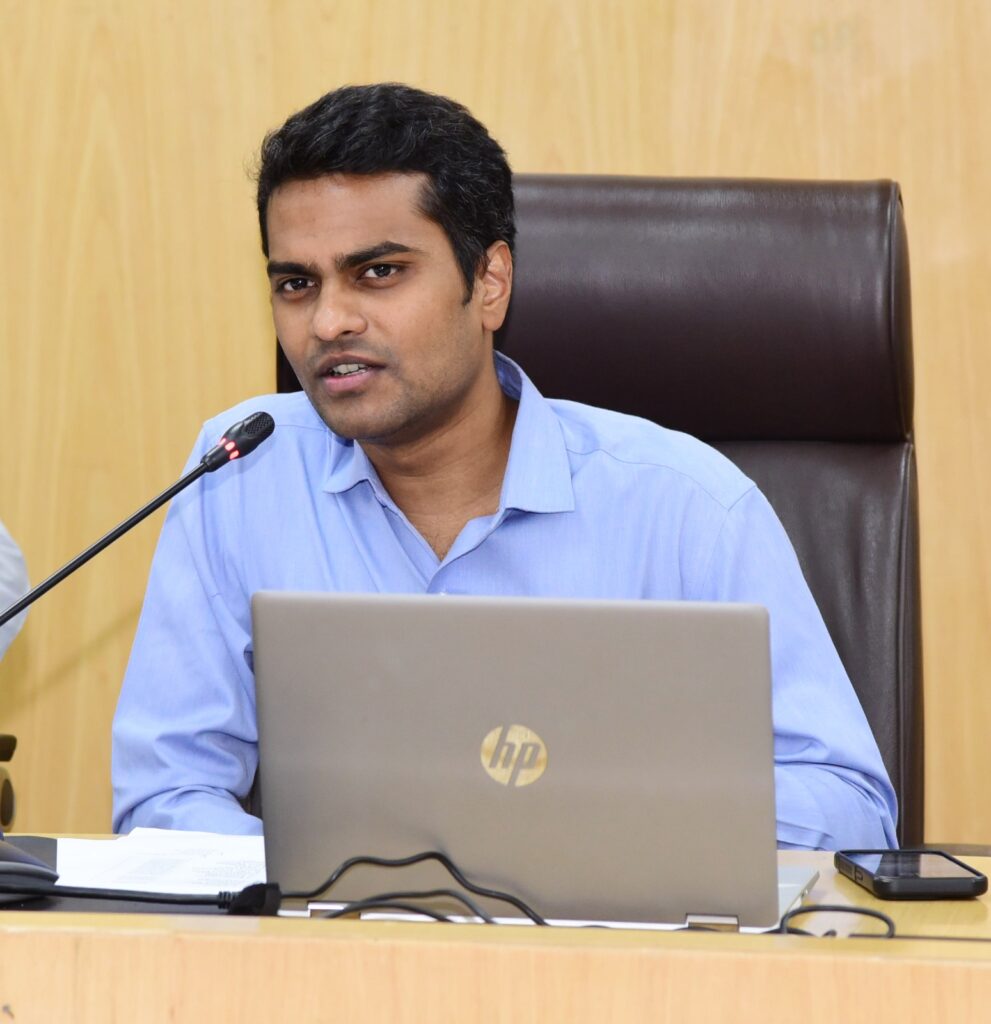Elections play a key role in forming governments with representatives elected by the people in a democratic system, and the media plays a key role in increasing the voting percentage in elections.
Election Commission of India
P. Pawan, Deputy Director, Elections
BY – RAJA PENTAPATI AP BUREAU CHIEF
National News
Amravati, June 20 (Bharat News) AP
Elections play a key role in forming governments with representatives elected by the people in a democratic system, and the media plays a key role in increasing the polling percentage in such elections, said P. Pawan, Deputy Director of the Election Commission of India.
He asked the regional media representatives to cooperate in sensitizing the voters by increasing the impact and reach of the Election Commission of India’s communication at the regional level. A face-to-face discussion program was held with representatives of print and electronic media and social media at the State Secretariat on Friday under the chairmanship of the State Chief Electoral Officer’s Office.
Election Commission of India Deputy Director P Pawan participated as the chief guest in the program and interacted with the media representatives.
Speaking on the occasion, he explained the 23 new initiatives taken by the Election Commission of India (ECI) to further strengthen the electoral process in a democratic system, the facilities provided to voters, political parties and election staff, procedural reforms, legal measures, ECI’s new innovations and resources. As part of the facilities provided to voters, after almost 20 years, a Special Universal Registration (SSR) program is being undertaken before the by-elections, the voter information slips will become more useful, and the voter serial number and part number will be clearly displayed.
He said that data related to death registration will be collected from the RGI database and changes will be made to the voter list after verification. He said that a maximum of 1200 voters are allowed per polling station, mobile deposit facility will be provided to voters, and additional polling booths will be set up in apartments/colonies.
He said that the campaigning distance limit for political parties has been reduced to 100 meters from the polling station entrance, a total of 4,719 meetings have been held with all parties across the country at the CEO/DEO/ERO level, in which more than 28,000 political party representatives have participated.
He said that meetings have been held with all India and state level party leaders (AAP, BJP, BSP, CPI(M), NPP) and training programmes have been organized for booth level agents from Bihar, Tamil Nadu and Puducherry at the India International Institute of Democracy and Election Management (IIIDEM).
He said that as part of the procedural reforms of the Election Commission, the dissemination of Voter Trend Report (VTR), index cards and statistical reports is being expedited through digitization. He said that a new comprehensive dashboard called ECINET has been launched, replacing more than 40 apps/websites with a single app and making all services available at one place at one time. He said that the problem of duplicate EPIC numbers has been solved by implementing the unique EPIC number system.
Standard photo ID cards will be issued to booth level officers for election personnel, training programmes have been conducted for more than 3,000 booth level supervisors in Delhi IIIDEM and training of more than 1 lakh BLO supervisors will be imparted in the coming years. He said that special training programmes have been conducted for media/communication officers of 36 states/UTs and Bihar Police officers through CEO offices in Delhi IIIDEM.
A national conference of lawyers and CEOs will be organized to strengthen the ECI legal framework and review the laws. He said that a total of 28 stakeholders (voters, officials, parties, candidates, etc.) have been identified to conduct training programmes based on the Representation of the People Acts (1950, 1951), the Registration of Voters Rules (1960), the Conduct of Elections Rules (1961) and the guidelines issued by the ECI. He said that along with the implementation of biometric attendance, regular meetings are being held with CEOs to implement the e-office system.
Similarly, information related to the Election Commission of India and the election process has been made available to the citizens through various websites, he said. He said that the latest information is being disseminated through official website: https://www.eci.gov.in/, SVEEP website: https://www.eci.gov.in/sveep-website, Myths vs. Reality: https://mythvsreality.eci.gov.in/, Photo Gallery: https://www.eci.gov.in/photo-gallery, Publications & Media: https://www.eci.gov.in/media-publication, Statistical Reports: https://www.eci.gov.in/statistical-reports, IIIDEM website: https://iiidem.eci.gov.in/ and other websites as well as social media platforms: X (Twitter), Facebook, YouTube, Instagram, Public App, WhatsApp Channel, LinkedIn.
Bharat News Andhra Pradesh
